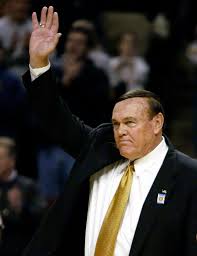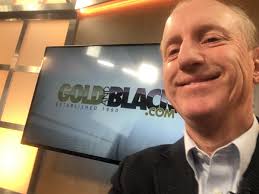The NBA Finals date back to 1947 (when they were known as the Basketball Association of America Finals) and the very 1st NCAA tourney was held in 1939. Olympic basketball competition is even older: it debuted as a demonstration event in 1904 and the men’s version became a medal sport in 1936, with the women finally getting their chance to go for the gold in 1976. The United States has dominated Olympic basketball competition from the start: the men have won 15 gold medals in the 18 tournaments they have participated in during the past 84 years, while the women have won 8 gold medals in the 10 tournaments in which they have competed during the past 44 years. Those of you who were looking forward to the 2020 Olympics opening ceremonies in Tokyo on July 24, 2020 will have to wait an extra 364 days, as the coronavirus caused a postponement until July 23, 2021. Due to the absence of college basketball since mid-March, HoopsHD’s Jon Teitel decided to fill the void by trying to interview as many prior Olympic players/coaches as possible so that you have something to read this summer while not watching the Summer Games. We continue our coverage by chatting with Alan Karpick (president/publisher of GoldandBlack.com) about Coach Gene Keady winning a gold medal as an assistant in 2000.
Keady was a 4-sport athlete at Garden City Junior College (where he was an All-American QB), then played several sports at Kansas State before being drafted by Pittsburgh in the 1958 NFL Draft: how good of an athlete was be back in the day before his career was cut short due to a knee injury? He did not play D-1 basketball but he was great at football and his 1st love was baseball because he was fleet afoot. He was a pretty talented guy.
In 1974 he became an assistant coach to Eddie Sutton at Arkansas, where he recruited the “Triplets” (Ron Brewer/Marvin Delph/Sidney Moncrief) who helped lead the Razorbacks to the 1978 Final 4 before a 5-PT loss to eventual champion Kentucky: what made him such a great recruiter? In those days he was pretty hard-nosed and a basketball lifer. He was very successful at Hutchinson JC and loved to go out on the road and build relationships: that was 1 of his biggest strengths back then.
He was hired as head coach at Purdue in 1980: why did he take the job, and what did the fans/alumni think about him when he arrived? He took the job because he was offered the job. He left Western Kentucky after only 2 years, which was a bit of a surprise, but he was just looking for that next opportunity. He really wanted his big chance even though Al McGuire discouraged him because Bobby Knight kind of controlled recruiting throughout the state of Indiana.
In the 1982 NIT title game he had a 9-PT loss to Bradley: where does that rank among the most devastating losses of his career? He made the NIT Final 4 in 1981 so I would not call it “devastating”. The NCAA tourney had not yet moved to 64 teams back then so it was still important, even though the goal was to make the NCAA tourney.
In the 1996 NCAA tourney #16-seed Western Carolina missed 2 shots in the final 10 seconds of a 2-PT loss: how close did he come to being the 1st #1 seed to ever lose its opening game? It was pretty close! That team had greatly overachieved and was the 1st team since Ohio State to win 3 undisputed Big 10 titles in a row. They were not good enough to run away from people.
Even though he never made a Final 4 he finished his career with a 20-19 record in NCAA tourney play due to pulling off many upsets as a lower-seed: do you think it was a result of his teams playing up/down to the level of their competition, or the fact that he did not bring in as many McDonald’s All-Americans as other big-time programs, or other? They were typically a higher seed and there were times that they struggled. He lost his opening tourney game 3 years in a row from 1984-1986. Not making the Final 4 was a function of not getting a couple of close calls, having Glenn Robinson get injured against Duke in 1994, etc. He was not wildly successful in the postseason but did have more success later in his career.
He made 16 NCAA tourneys during an 18-year stretch from 1983-2000 and is the winningest coach in school history with 493 wins (which is #3 in Big 10 history behind Tom Izzo/Bobby Knight): how was he able to remain so successful/consistent for almost 2 decades? He was a bulldog who put in a lot of hard work to get his players to play hard for him. In his entire career he only had about 3 McDonald’s All-Americans but was known for being an overachiever. He/John Chaney/Norm Stewart are 3 of the greatest coaches to never make the Final 4 but are all well-respected.
He assisted in selecting the 1984/1988 US Olympic teams and won a gold medal as an assistant coach for team USA at the 2000 Olympics: how did he get those jobs, and what did it mean to him to win a gold medal? Fred Schaus discovered him working at an Olympic Festival event in 1979, which is how he got started in USA Basketball. When Knight was head coach in 1984 Keady helped out with evaluations and he coached several international teams over the years. He inched his way up to the opportunity in 2000, which was due to the respect he received based on his college success.
He has an incredible coaching tree including Bruce Weber/Kevin Stallings/Steve Lavin/Matt Painter: how proud is he of all their success, and what made him such a good mentor? I think that it is his proudest accomplishment because many of those guys played for him as well, including Cuonzo Martin. He was a good mentor because he let his assistants do their own jobs. Bruce did a lot of behind-the-scenes work which helped build his foundation as a coach, while Lavin was initially a volunteer assistant before Gene gave him areas of responsibility. He also gave them high expectations but he was a very approachable person. He was not stuck up/pretentious and happy to let others give their feedback.
He was a 6-time national COY from 1984-2000, inducted into the NJCAA Hall of Fame as a player and coach, and inducted into the College Basketball Hall of Fame in 2013: when people look back on his career, how do you think that he should be remembered the most? He has certainly been on the cusp of making the Naismith Hall of Fame because he is a Hall of Fame-level coach. His legacy is pretty secure as a coach’s coach who is very beloved by everyone I can think of. Knight was his archrival and Gene beat Knight more than Knight beat him so the Purdue fans loved him. He had a great deal of success and was a big-time motivator/self-made person. He did not have a silver spoon in his mouth but was a hard worker. He was a grinder/bulldog who other coaches could relate to, and spending 25 years at the same school got people’s attention.




